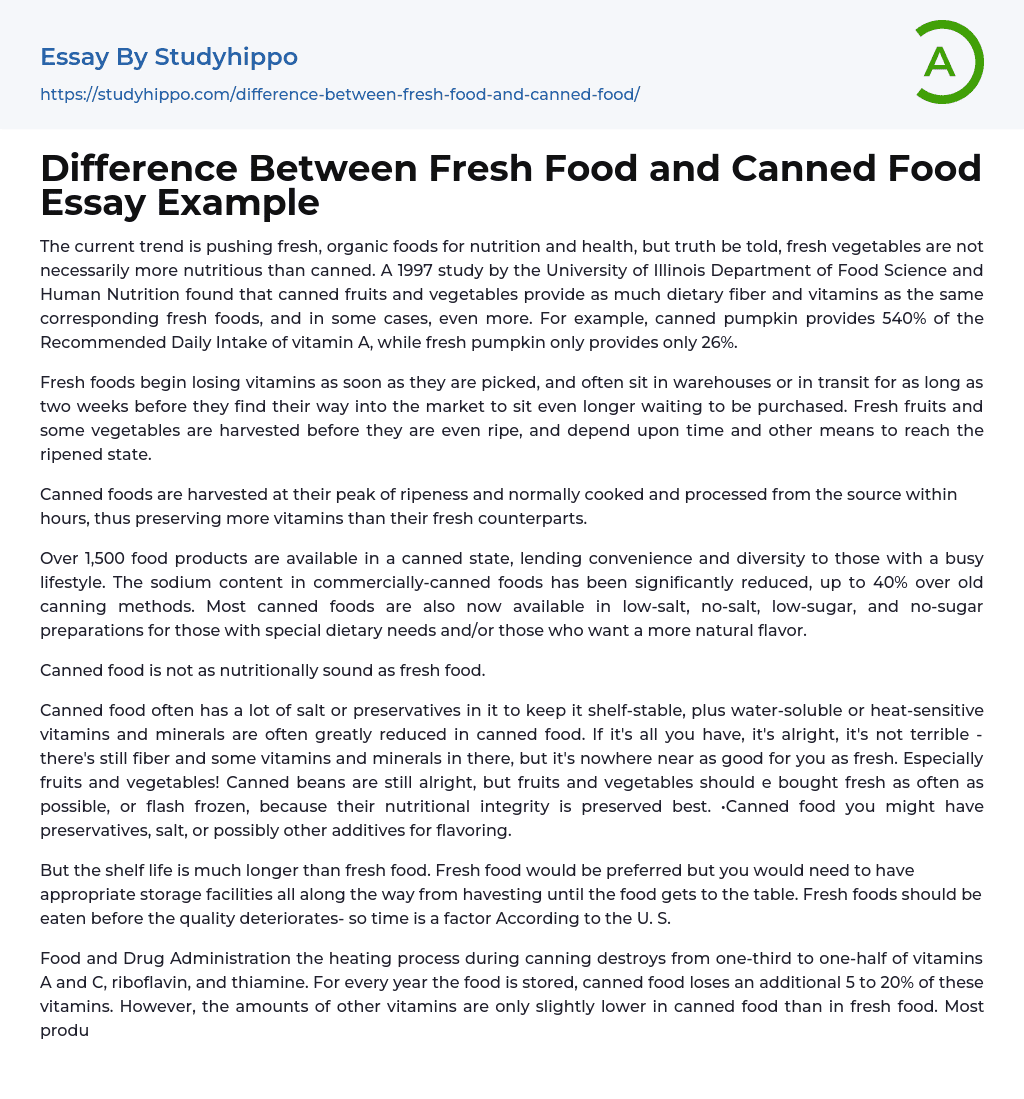The current trend is pushing fresh, organic foods for nutrition and health, but truth be told, fresh vegetables are not necessarily more nutritious than canned. A 1997 study by the University of Illinois Department of Food Science and Human Nutrition found that canned fruits and vegetables provide as much dietary fiber and vitamins as the same corresponding fresh foods, and in some cases, even more. For example, canned pumpkin provides 540% of the Recommended Daily Intake of vitamin A, while fresh pumpkin only provides only 26%.
Fresh foods begin losing vitamins as soon as they are picked, and often sit in warehouses or in transit for as long as two weeks before they find their way into the market to sit even longer waiting to be purchased. Fresh fruits and some vegetables are harvested before they are even ripe, and depend upon ti
...me and other means to reach the ripened state.
Canned foods are harvested at their peak of ripeness and normally cooked and processed from the source within hours, thus preserving more vitamins than their fresh counterparts.
Over 1,500 food products are available in a canned state, lending convenience and diversity to those with a busy lifestyle. The sodium content in commercially-canned foods has been significantly reduced, up to 40% over old canning methods. Most canned foods are also now available in low-salt, no-salt, low-sugar, and no-sugar preparations for those with special dietary needs and/or those who want a more natural flavor.
Canned food is not as nutritionally sound as fresh food.
Canned food often has a lot of salt or preservatives in it to keep it shelf-stable, plus water-soluble or heat-sensitive vitamins
and minerals are often greatly reduced in canned food. If it's all you have, it's alright, it's not terrible - there's still fiber and some vitamins and minerals in there, but it's nowhere near as good for you as fresh. Especially fruits and vegetables! Canned beans are still alright, but fruits and vegetables should e bought fresh as often as possible, or flash frozen, because their nutritional integrity is preserved best. •Canned food you might have preservatives, salt, or possibly other additives for flavoring.
But the shelf life is much longer than fresh food. Fresh food would be preferred but you would need to have appropriate storage facilities all along the way from havesting until the food gets to the table. Fresh foods should be eaten before the quality deteriorates- so time is a factor According to the U. S.
Food and Drug Administration the heating process during canning destroys from one-third to one-half of vitamins A and C, riboflavin, and thiamine. For every year the food is stored, canned food loses an additional 5 to 20% of these vitamins. However, the amounts of other vitamins are only slightly lower in canned food than in fresh food. Most produce will begin to lose some of its nutrients when harvested.
When produce is handled properly and canned quickly after harvest, it can be more nutritious than fresh produce sold in stores.
When refrigerated, fresh produce will lose half or more of some of its vitamins within 1 to 2 weeks. If it's not kept chilled or preserved, nearly half of the vitamins may be lost within a few days of harvesting. For optimum nutrition, it is
generally recommended that a person eat a variety of foods.
Most produce will begin to lose some of its nutrients when harvested. When produce is handled properly and canned quickly after harvest, it can be more nutritious than fresh produce sold in stores.
- Food Safety essays
- Food Security essays
- Beverages essays
- Cuisines essays
- Dairy essays
- Desserts essays
- Fast Food essays
- Bread essays
- Meal essays
- Meat essays
- Organic Food essays
- Rice essays
- Sugar essays
- Taste essays
- Beef essays
- Coconut essays
- Crowd essays
- Dinner essays
- Juice essays
- Sainsbury essays
- Cooking essays
- Ginger essays
- Oreo essays
- Drink essays
- Beer essays
- Wine essays
- Coffee essays
- Tea essays
- Cake essays
- Hamburger essays
- Ice Cream essays
- Burger essays
- Pizza essays
- Fruit essays
- Lemon essays
- Food Waste essays
- Favorite Food essays
- Alcoholic essays
- Soft Drinks essays
- Cookie essays
- Starch essays
- Yeast essays
- Cola essays
- Pizza Hut essays
- snack foods essays
- chips essays
- Biscuit essays
- Brewing essays
- Brewery essays
- Anorexia essays




